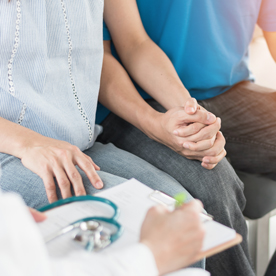Nobody knows how long it will take to get pregnant once a couple has decided to try for a baby. Some women conceive quickly, while others take longer. According to the family planning charity FPA, around 30 out of every 100 couples trying for a baby and having regular sexual intercourse will conceive within one month. Seventy-five couples out of 100 will conceive within six months, and 80 - 90 per cent will get pregnant within a year. That leaves 10 - 20 per cent who may take longer than a year, some of whom will need help to conceive (i).
The NHS claims that having sex every two to three days throughout the month will give you the best chance of getting pregnant (ii). But there are some things you may need to know about beforehand, especially if you have a medical condition or a disability.
Why you should see your GP
It’s advisable to speak to your GP if you’re trying for a baby and have any medical condition, including diabetes, epilepsy, heart or circulation problems (including high blood pressure) or gynaecological problems such as endometriosis or polycystic ovary syndrome (PCOS). Our guide to understanding PCOS and fertility can help you discover how it may be affecting your chances of conception. If you’re being treated for a medical condition, there’s a small chance that your medication may not be suitable to take while trying for a baby or during pregnancy, so your doctor will need to know about your plans as soon as possible.
Even some over-the-counter medicines can affect your fertility, so always ask the pharmacist for advice before buying any non-prescribed remedies.
Your GP can also refer you for genetic counselling if a hereditary condition such as muscular dystrophy or cystic fibrosis runs in your or your partner’s family. In addition they will advise women who are trying for a baby to take a 400mcg folic acid supplement from while they’re trying to conceive through to week 12 of their pregnancy. This is standard medical advice for all women, as it helps prevent serious abnormalities in unborn babies such as spina bifida.
Infection protection
If you get German measles while you’re pregnant, the infection can damage your baby’s heart, eyes and ears seriously. That’s why women who haven’t had German measles or a rubella vaccination (the jab that protects against German measles) are strongly advised have a rubella test before trying to get pregnant.
Even if you have had the rubella jab or German measles itself, it’s a good idea to take the rubella test, as there is a chance you may not still be immune. If you’re not immune, you can get the jab from your GP or nurse – ideally you should have it at least a month before starting to try for a baby.
Contraception issues
Depending on the contraception you’ve been using, your cycle may take a short while to get back to normal when you stop (this only applies to hormonal contraception such as the pill, contraception injections or the IUD).
The only method of contraception that causes infertility is sterilisation, so there’s no need to be concerned if your cycle doesn’t return to normal straight away.
Conception and your lifestyle
The fitter and healthier you and your partner are, the better your chances are of becoming pregnant and having a healthy pregnancy. So if your lifestyle could do with a bit of improvement, now’s the perfect time to make some changes.
Shed some pounds
If you’re a woman and need to lose weight – or indeed gain some weight – you may find that your menstrual cycle isn’t normal, which can reduce your likelihood of getting pregnant.
According to the NHS, if you’re overweight you may have problems getting pregnant, plus fertility treatment may be less likely to work (iii). Being overweight (having a BMI of 25 or higher) or obese (BMI 30 or higher) may also increase your risk of certain pregnancy problems, such as high blood pressure, miscarriage, gestational diabetes and blood clots.
Meanwhile, if your BMI is less than 18.5, it means you’re underweight. Women who are underweight may have irregular or non-existent periods. But if they gain enough weight to have a normal BMI, their chances of conceiving may improve as their menstrual cycle starts working normally again.
Give up smoking
Women who smoke are thought to have reduced fertility. Even living with someone who smokes if they’re a non-smoker can affect their chances of getting pregnant.
If you do become pregnant and carry on smoking, you may have an increased risk of one or more pregnancy and birth problems, including miscarriage, stillbirth, premature birth, having a baby with a low birth weight and other pregnancy and labour complications (iv).
If you or your partner smokes, giving up is one of the most important things you can do, not just for yourself but for your baby too. Even after your baby has been born, not smoking can make them less likely to develop coughs and chest infections than babies whose parents do smoke. Smokers’ babies are also more likely to have a higher risk of sudden infant death syndrome (SIDS) (iv).
There’s lots of help available if you need to quit. Stop smoking aids that reduce your cravings for nicotine are available from your GP and at pharmacies, including patches, gum and lozenges.
Cut down on alcohol
Drinking a lot of alcohol can affect a man’s sperm production, which could affect a couple’s chances of getting pregnant. Women who are pregnant or trying for a baby are advised that the safest approach is not to drink alcohol at all to keep risks to their baby to a minimum (v).
Meanwhile, if you’re a woman and you drink heavily and regularly while pregnant – or if you binge drink on a regular basis – it can affect your baby’s development, and potentially cause them to develop a condition called foetal alcohol syndrome. This can lead to poor growth, facial abnormalities as well as learning and behavioural problems.
Stay active
According to the NHS, the more active and fit you are while you’re pregnant the easier it may be for you to adapt to your changing shape and weight, as well as help you cope with labour and getting back into shape after the birth (vi). But not all types of exercise may be suitable during pregnancy – contact sports, for instance, or any activity where there’s a chance you could be struck in the abdomen.
Try something easy to start off with, especially if you haven’t done much exercise lately – such as walking or swimming. Many women like to practise yoga or Pilates while trying for a baby and when pregnant, as both can make you feel more relaxed (which makes them good for dads-to-be too).
If you’re not sure what exercise you should be doing when you’re pregnant – and how much – have a chat with your GP or midwife about it before you start.
Ovulation: the best time to conceive
According to the NHS, you’re most likely to get pregnant if you have sex within a day or so of ovulation, which is when one of your ovaries releases and egg (ii). It can be difficult to know when this happens exactly, so understanding how your cycle works, including when during your cycle you’re likely to be at your most fertile, may be useful.
Menstruation
The day a woman’s period starts marks the beginning of her cycle. Lasting from two to eight days, menstruation is caused by the shedding of the endometrium (lining of the uterus). Levels of the hormones oestrogen and progestogen are low right now, but your brain starts to produce FSH (follicle stimulating hormone) to stimulate the growth of new egg follicles.
Post-menstruation
For four to five days after your period finishes your hormone levels are still low.
Pre-ovulation
During the next three or four days, you start producing more oestrogen (oestrogen production peaks at around day 12).
Ovulation
The next few days is when a woman is at her most fertile, with ovulation usually happening at around day 14. This is when the egg released from the ovaries travels along the fallopian tubes and into the uterus. Once released, an egg only lives for 12-24 hours – so it must be fertilised by a sperm during this time. However, sperm can live for up to seven days inside a woman’s body,. That means the egg could be fertilised by sperm that entered her body several days before her egg was released.
Post-ovulation
Ovulation triggers the production of another hormone, progesterone. This helps to thicken the lining of the uterus, making it a suitable environment for a fertilised egg.
Premenstruation
If the egg hasn’t been fertilised, it is reabsorbed into the body. Your hormone levels may be high for a few days – leading to premenstrual syndrome (PMS) symptoms in some women – and then fall again as the endometrium breaks down and your cycle comes to an end.
Conception problems
Sometimes, even when you do everything you’re supposed to, you may still take a while to get pregnant. In fact, according to FPA, while some women may get pregnant very quickly, it’s normal for it to take longer (i).
Here are some of the things that may affect your chances:
-
If you’re a woman, you may not be ovulating regularly.
-
For four to five days after your period finishes your hormone levels are still low.
-
If you’re a man, there may be a problem with your sperm (that is, you may not be producing large enough numbers or the quality of your sperm may not be high enough). According to FPA, sperm production can be damaged by mumps, untreated sexually transmitted infections, injury to the testicles, excessive heat (such as hot baths), tight fitting underwear, alcohol, smoking, recreational drugs or other unknown causes (i).
-
Your chances of conceiving get lower as you get older – it’s generally accepted that women over the age of 35 tend to find it more difficult to get pregnant than younger women as female fertility declines rapidly after this age (vii).
Your GP can advise you if you’re worried you’ve been trying for a baby for a long time, without any success. If you’ve been trying for a year or more (or six months or longer if you’re a woman over the age of 35), speak to your GP about it. However, this doesn’t mean you have a medical problem.
But if you’ve been trying for a baby for two years or more, during which time you’ve had regular unprotected sex, there is a chance that either you or your partner (or even both of you) may have a fertility issue.
According to the NHS, for 25 per cent of couples who have fertility problems there is no reason (viii) – this is called unexplained fertility problems by doctors and other healthcare professionals. Otherwise fertility problems may be caused by a low sperm count or poor quality sperm in men, or because a woman does not ovulate regularly or because her fallopian tubes are damaged or blocked.
If you’re worried that you may have a fertility problem, see your GP for an initial assessment.
Natural conception support
Having the healthiest lifestyle possible may increase your chances of becoming pregnant. That means eating a nutritious diet, cutting down on alcohol, taking regular exercise and not smoking. Taking certain natural supplements may also help support your body while you try for a baby – and during the pregnancy itself – including the following:
Folic acid
Government health experts advise all women who are planning a pregnancy to take a daily supplement of folic acid (iii). A member of the B vitamin family, folic acid is essential for a baby’s development during the early weeks of pregnancy, and helps prevent serious brain and nerve defects such as spina bifida.
You should take 400mcg (0.4mg) a day from the time you start trying for a baby (or as soon as you find out you’re pregnant) until the 12th week of your pregnancy. Some women may be advised to take a higher dose if they or their partner has a neural tube defect, or if they had a previous pregnancy that was affected by a defect such as spina bifida.
As well as taking a supplement, you can get more folic acid in your diet by eating fortified breads and cereals as well as lots of green leafy vegetables.
High-strength multivitamin and mineral
A range of nutrients are also thought to be important for both male and female fertility, all of which can be found in a high-quality multivitamin and mineral supplement. Look for a supplement with a good level of zinc, which is essential for healthy hormone production in women and healthy sperm production in men.
Fish oils
The omega-3 fatty acids found in oily fish support a healthy reproductive system as they help regulate reproductive hormone function. Some experts believe omega-3 supplements may boost sperm count and motility in men (ix). Others believe they are needed for a baby’s brain development (x), which may explain why many natural health practitioners advise women to take fish oil supplements for three months before they start trying for a baby.
If you’re a vegetarian or vegan you can still benefit from an omega-3 supplement, thanks to the availability of products that contain the natural triglyceride (TG) form of omega-3, which is sourced from plant organisms called microalgae rather than fish.
Iron
Iron deficiency affects many women of reproductive age, especially those who have heavy periods. There’s also lots of evidence that many girls and women of reproductive age don’t get enough iron in their diets (xi), making iron a common mineral deficiency in this country. Many, however, may not be aware of how having low iron levels may reduce their fertility.
Indeed, one study suggests women who take iron supplements have a significantly lower risk of ovulatory infertility than those not taking iron pills (ovulatory infertility means an inability to make healthy eggs) (xii).
Iodine
Researchers writing in the journal Nutrients suggest that 60 per cent of pregnant women do not meet the World Health Organization recommended intake of iodine (xiii). However this mineral is essential for a baby’s brain and nervous system development, and low levels have been linked with an increased risk of pregnancy problems such as miscarriage and premature birth. One study also suggests babies born to women with low iodine levels in early pregnancy may have lower IQ levels at the age of eight and a decreased reading ability at the age of nine than others born to mums with healthy iodine levels (xiv).
Iodine found in dairy products, seafood, brewer’s yeast, eggs and vegetables, but you can also find it in kelp supplements (always check with your GP before taking kelp tablets during pregnancy).
Vitamin B3
Research carried out at the Victor Chang Cardiac Research Institute in Sydney, Australia, suggests taking vitamin B3 supplements could reduce the number of miscarriages and certain birth defects (xv). According to the researchers behind the study, vitamin B3 may help the body produce a substance called nicotinamide adenine dinucleotide (NAD), which they have linked to healthy foetal development. A lack of NAD may prevent a baby’s organs from developing normally in the womb, the researchers claim. Vitamin B3 is found naturally in meats and green vegetables, as well as in supplement form. For more support on fertility, see our tips for natural conception.
Trying for a baby can be full of ups and downs, but we hope this guide makes it a little easier. For more information on a range of other common health concerns, visit our health library.
References:
-
Available online: https://www.fpa.org.uk/sites/default/files/planning-a-pregnancy.pdf
-
Available online: https://www.nhs.uk/conditions/pregnancy-and-baby/getting-pregnant/
-
Available online: https://www.nhs.uk/conditions/pregnancy-and-baby/planning-pregnancy/?tabname=getting-pregnant
-
Available online: https://www.nhs.uk/conditions/pregnancy-and-baby/smoking-pregnant/
-
Available online: https://www.nhs.uk/conditions/pregnancy-and-baby/alcohol-medicines-drugs-pregnant/
-
Available online: https://www.nhs.uk/conditions/pregnancy-and-baby/pregnancy-exercise/
-
Available online: https://www.reproductivefacts.org/news-and-publications/patient-fact-sheets-and-booklets/documents/fact-sheets-and-info-booklets/age-and-fertility/
-
Available online: https://www.nhs.uk/conditions/infertility/causes/
-
Safarinejad . MR., Safarinejad S., The roles of omega-3 and omega-6 fatty acids in idiopathic male fertility. Asian J Androl. 2012 Jul;14(4):514-515. Available online: https://www.ncbi.nlm.nih.gov/pmc/articles/PMC3720081/
-
Coletta. JM, Bell. SJ, Roman. AS. Omega-3 Fatty Acids and Pregnancy. Rev Obstet Gynecol. 2010 Fall;3(4):163-171.Available online: https://www.ncbi.nlm.nih.gov/pmc/articles/PMC3046737/
-
Available online: https://assets.publishing.service.gov.uk/government/uploads/system/uploads/attachment_data/file/339309/SACN_Iron_and_Health_Report.pdf
-
Chavarro. JE, Rich-Edwards. JW, Rosner. BA, Willett. WC. Iron intake and risk of ovulatory infertility. Obstet Gyncol. 2006 Nov;108(5):1145-52.
-
Bouga. M, Lean. MEJ, Combet. E. Iodine and Pregnancy – A Qualitative Study Focusing on Dietary Guidance and Information. Nutrients. 2018 Apr;10(4):408.Available online: https://www.ncbi.nlm.nih.gov/pmc/articles/PMC5946193/
-
Bath. SC, Steer. CD, et al. Effect of inadequate iodine status in UK pregnant women on cognitive outcomes in their children: results from the Avon Longitudinal Study of Parents and Children (ALSPAC). The Lancet. 27 July 2013.Volume 382, No. 9889, p331-337.
-
Hongjun. S, et al. NAD Deficiency, Congenital Malformations, and Niacin Supplementation. N Engl J Med . 2017: 377:544-552.
Related Posts
Disclaimer: The information presented by Nature's Best is for informational purposes only. It is based on scientific studies (human, animal, or in vitro), clinical experience, or traditional usage as cited in each article. The results reported may not necessarily occur in all individuals. Self-treatment is not recommended for life-threatening conditions that require medical treatment under a doctor's care. For many of the conditions discussed, treatment with prescription or over the counter medication is also available. Consult your doctor, practitioner, and/or pharmacist for any health problem and before using any supplements or before making any changes in prescribed medications.

Christine
Christine Morgan has been a freelance health and wellbeing journalist for almost 20 years, having written for numerous publications including the Daily Mirror, S Magazine, Top Sante, Healthy, Woman & Home, Zest, Allergy, Healthy Times and Pregnancy & Birth; she has also edited several titles such as Women’ Health, Shine’s Real Health & Beauty and All About Health.
View More



